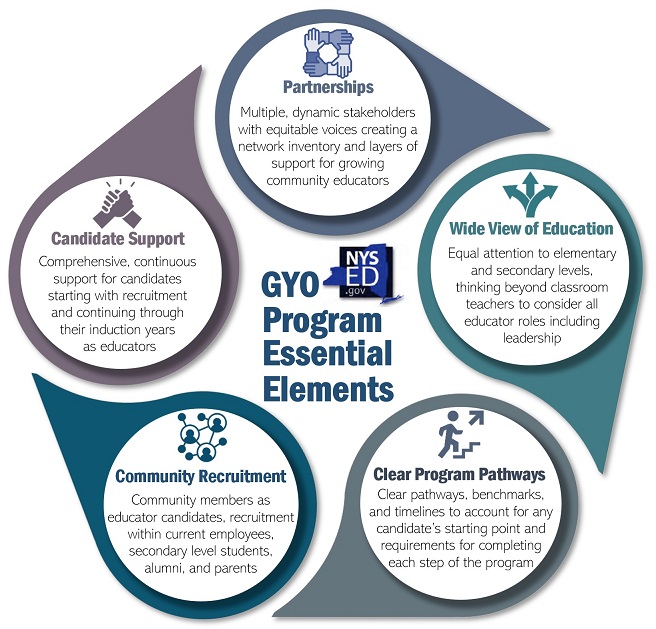Essential Elements of GYO Programs
There are five essential elements within every Grow Your Own (GYO) program
Partnerships
GYO partnerships are dynamic, consisting of multiple stakeholders with equitable voices. Some partnerships are school-to-school within the same Local Education Agency (LEA) and others reach across district lines to share GYO resources, costs, and ideas. In New York State, some districts partner with their local Board of Cooperative Educational Services (BOCES), whose services include many GYO initiatives. BOCES can also operate as a hub for districts to connect with colleges and universities, or LEAs can partner with institutions directly. There are also community and regional organizations with missions to support community educators, and in their partnerships with school districts, BOCES, and institutions of higher education, they collectively operate as consortia.
When LEAs partner with those around them, they create a network inventory and layers of support for growing community educators. From the micro to macro level, GYO partnerships are essential to growing community members into community educators. (See GYO Entry Points: Needs Assessment & Network Inventory, as well as Tools & Resources: Network Inventory to discover partnership opportunities for your LEA.)
Wide View of Education
GYO programs take a wide view of education, recognizing that the educator staffing issues extend outside the classroom into numerous offices throughout LEAs. GYO programs think beyond classroom teachers to consider teaching assistants, social workers, school counselors, and school and district leaders as well. Within the classroom teacher role, GYO programs attend equally to the elementary and secondary levels and are also inclusive of special education and English to speakers of other languages candidates. By maintaining a wide view of education, LEAs can address all the educator needs they may have and also recruit candidates into education who may have otherwise been excluded by a limited recruitment scope.
Clear Program Pathways
Individuals interested in entering the field of education must understand the sequential steps of the preparation program they enroll in, requirements for program completion, and requirements for certification. Some candidates may still be in high school, have some or no college experience, or have some or no work experience in schools. It can be difficult for these candidates to know where to start. GYO programs provide clear pathways to account for any candidate’s starting point. Working with their partners, GYO programs can create curriculums, informational documents and visuals describing those curriculums, as well as benchmarks and calendars so candidates understand their unique requirements and timelines for completing each step of the program.
Community Recruitment
GYO programs recognize the value of local educators and thus implement community-focused recruitment to fill current and projected vacancies. GYO programs see educator candidates in current employees (e.g., paraprofessionals), students at the secondary level and recent alumni, and community members (e.g., parents who volunteer for school events). Current employees and parent volunteers who have been working with community students in various capacities are highly aware of local students’ needs. In addition, students involved in GYO programs often return to their home schools after receiving their certification.1 Because their path to education began early and from within, they are often the best candidates to fill local educator positions. (See GYO Entry Points: Recruitment for strategies in identifying community candidates.)
Candidate Support
GYO programs should provide comprehensive, continuous support for candidates, often through the form of mentorship, starting with recruitment and continuing through their induction year(s) as educators. This support can address candidates’ academic and professional needs by providing tutoring, certification test preparation, and application, resume, and cover letter guidance. Candidates’ social needs are also met in cohorts, a cornerstone of GYO programs, in which candidates cultivate support from and for their peers through shared experiences (See GYO Entry Points: Cohorts & Mentorship for more information).
Candidates also receive pedagogical support at GYO events such as educational forums, campus visits, and other professional development activities. Through comprehensive GYO partnerships, multiple hosts (districts, BOCES, 2-year and 4-year colleges and universities, and community organizations) share the cost of local educational conferences. Candidates gain ample professional development support at these conferences as participants and presenters during plenary sessions, panel discussions, roundtable discussions, presentations, and poster galleries.
With the exception of early recruitment GYO programs (e.g., Take a Look at Teaching clubs), it is critical for GYO programs to provide wrap-around services for candidates, such as stipends, salaries, benefits, childcare, tuition reimbursement, technology, course materials, transportation, and other costs of living. This financial support is funded by federal and state grants, financial aid, or is sometimes incorporated into LEA budgets. (See Funding Opportunities for more information on funding sources for supporting candidates in GYO programs.)
1Ingersoll, R. M., & Tran, H. (2023). Teacher Shortages and Turnover in Rural Schools in the US: An Organizational Analysis. Educational Administration Quarterly, 59(2), 396–431.






